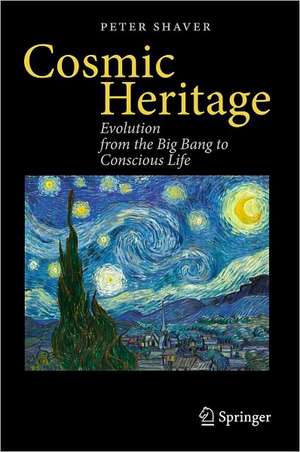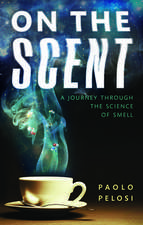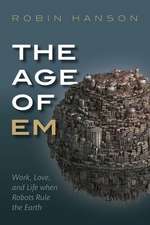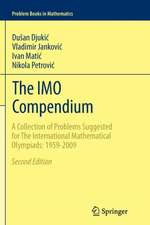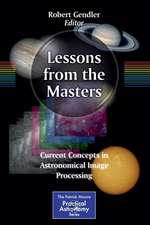Cosmic Heritage: Evolution from the Big Bang to Conscious Life
Autor Peter Shaveren Limba Engleză Paperback – 26 aug 2011
Preț: 253.59 lei
Nou
Puncte Express: 380
Preț estimativ în valută:
48.52€ • 50.80$ • 40.15£
48.52€ • 50.80$ • 40.15£
Carte disponibilă
Livrare economică 15-29 martie
Preluare comenzi: 021 569.72.76
Specificații
ISBN-13: 9783642202605
ISBN-10: 3642202608
Pagini: 240
Ilustrații: VII, 268 p. 7 illus. in color.
Dimensiuni: 155 x 235 x 23 mm
Greutate: 0.43 kg
Ediția:2011
Editura: Springer Berlin, Heidelberg
Colecția Copernicus
Locul publicării:Berlin, Heidelberg, Germany
ISBN-10: 3642202608
Pagini: 240
Ilustrații: VII, 268 p. 7 illus. in color.
Dimensiuni: 155 x 235 x 23 mm
Greutate: 0.43 kg
Ediția:2011
Editura: Springer Berlin, Heidelberg
Colecția Copernicus
Locul publicării:Berlin, Heidelberg, Germany
Public țintă
Popular/generalCuprins
Setting the scene.- The universe is expanding and evolving.- What’s the matter?.- Inner and outer space.- The origin of our universe – and others?.- Is our universe fine-tuned for life?.- The universe on fast forward.- The cradles of life.- The astonishing diversity of life.- The astonishing unity of life.- How did life begin?.- How did life evolve?.- Comings and goings.- Did cognition evolve?.- What about consciousness?.- Are we special?.- Are we alone in the universe?.- What is the future of the universe?.- Why should we be able to understand the universe at all?.- Epilogue.- Further Reading.- Acknowledgements.- Index.
Recenzii
From the reviews:
“Peter Shaver has written engagingly for anyone curious about the world we inhabit. If you'd like to know how the Universe began, where the chemical elements originated, how life may have started on Earth, how man, ants and bacteria are related to each other, or why we humans think, you will enjoy this panoramic book and its clear presentation” – Martin Harwit, Professor Emeritus of Astronomy, Cornell University, NY, and former Director of the Smithsonian National Air and Space Museum, Washington.
"Who is not interested in the big questions "How did it all start? Where do we come from? Where do we go? Are we alone?" This book addresses theses questions in an entertaining way based on our knowledge of modern science. It opens our horizons towards understanding the history of the universe and the origin and evolution of life in the context of cosmic evolution." Dr. Gerda Horneck, DLR German Aerospace Center, Institute of Aerospace Medicine, Cologne, Germany.
"A very elegant, open-minded book that opens the door for informed discussion of the continuity of evolutionary processes from the big bang to the emergence of the mind... stimulating and highly engaging reading" – Ryszard Maleszka, Professor of Molecular Genetics, Australian National University, Canberra.
"Peter Shaver has produced a remarkable book. He covers an immense range, offering a splendid overview of the intricate processes that connect us to the universe, and which allowed complex life to emerge from simple beginnings" – Martin Rees, Master of Trinity College, Cambridge and Astronomer Royal.
“Where did the universe come from? What is life and how did it begin? How did complex life-forms evolve? How did consciousness arise? Are we alone in the universe? Questions don't get any bigger than these. In this beautifully concise account, astrophysicist Peter Shaver asks these questions and more and assesses how far modern science has come to providing answers. Anyone who has ever wondered who we are and where we came from should read this book” – Stephen Simpson, Professor of Biological Sciences, University of Sydney.
“This is a well written, marvellous book for a very broad audience which covers much of current scientific thought in a concise way. The author successfully shows how many of the great philosophical issues that have fascinated humanity for centuries from the origin of the world, the evolution of life to the nature of consciousness are gradually being shifted from the domain of philosophy or speculation to that of rigorous science.” – Lodewijk Woltjer, former Director General of the European Southern Observatory and former President of the International Astronomical Union.
“There are things in it to be learned at any age from 14 to 114 … . the handful of colour plates are indeed colourful … . All in all, a book to read, share, and check.” (Virginia Trimble, The Observatory, Vol. 132 (1227), April, 2012)
“This book is the accessible story of the evolutionary way of the development of the Universe from the Big Bang to the present time, including conscious life. … The fundamental discovery of the extrasolar planet and the questions what is the fate of the Universe in the Future and can be able to foresee are also discussed. … helpful for readers to understand the Universe and our role and place in it. The list of books and papers for further reading is also available.” (Nina A. Solovaya, Zentralblatt MATH, Vol. 1232, 2012)
“Peter Shaver has written engagingly for anyone curious about the world we inhabit. If you'd like to know how the Universe began, where the chemical elements originated, how life may have started on Earth, how man, ants and bacteria are related to each other, or why we humans think, you will enjoy this panoramic book and its clear presentation” – Martin Harwit, Professor Emeritus of Astronomy, Cornell University, NY, and former Director of the Smithsonian National Air and Space Museum, Washington.
"Who is not interested in the big questions "How did it all start? Where do we come from? Where do we go? Are we alone?" This book addresses theses questions in an entertaining way based on our knowledge of modern science. It opens our horizons towards understanding the history of the universe and the origin and evolution of life in the context of cosmic evolution." Dr. Gerda Horneck, DLR German Aerospace Center, Institute of Aerospace Medicine, Cologne, Germany.
"A very elegant, open-minded book that opens the door for informed discussion of the continuity of evolutionary processes from the big bang to the emergence of the mind... stimulating and highly engaging reading" – Ryszard Maleszka, Professor of Molecular Genetics, Australian National University, Canberra.
"Peter Shaver has produced a remarkable book. He covers an immense range, offering a splendid overview of the intricate processes that connect us to the universe, and which allowed complex life to emerge from simple beginnings" – Martin Rees, Master of Trinity College, Cambridge and Astronomer Royal.
“Where did the universe come from? What is life and how did it begin? How did complex life-forms evolve? How did consciousness arise? Are we alone in the universe? Questions don't get any bigger than these. In this beautifully concise account, astrophysicist Peter Shaver asks these questions and more and assesses how far modern science has come to providing answers. Anyone who has ever wondered who we are and where we came from should read this book” – Stephen Simpson, Professor of Biological Sciences, University of Sydney.
“This is a well written, marvellous book for a very broad audience which covers much of current scientific thought in a concise way. The author successfully shows how many of the great philosophical issues that have fascinated humanity for centuries from the origin of the world, the evolution of life to the nature of consciousness are gradually being shifted from the domain of philosophy or speculation to that of rigorous science.” – Lodewijk Woltjer, former Director General of the European Southern Observatory and former President of the International Astronomical Union.
“There are things in it to be learned at any age from 14 to 114 … . the handful of colour plates are indeed colourful … . All in all, a book to read, share, and check.” (Virginia Trimble, The Observatory, Vol. 132 (1227), April, 2012)
“This book is the accessible story of the evolutionary way of the development of the Universe from the Big Bang to the present time, including conscious life. … The fundamental discovery of the extrasolar planet and the questions what is the fate of the Universe in the Future and can be able to foresee are also discussed. … helpful for readers to understand the Universe and our role and place in it. The list of books and papers for further reading is also available.” (Nina A. Solovaya, Zentralblatt MATH, Vol. 1232, 2012)
Notă biografică
The author is Canadian, obtained a PhD in astrophysics at the University of Sydney in Australia, and spent most of his career as a senior scientist at the European Southern Observatory (ESO), based in Munich. He has authored or co-authored over 250 scientific papers, and edited six books on astronomy and astrophysics. His interests have ranged from our galaxy to distant quasars and the reionization of the universe. He was instrumental in the establishment of Europe’s participation in the Atacama Large Millimeter/submillimeter Array (ALMA) project. A member of various international organizations and committees, he served as President of the International Astronomical Union’s Division on Galaxies and the Universe. Now retired, he and his Australian wife split their time between Sydney, Toronto, and Europe, and he devotes himself to broadening his horizons in science, in the process having written this book.
Textul de pe ultima copertă
This book follows the evolutionary trail all the way from the Big Bang 13.7 billion years ago to conscious life today. It is an accessible introductory book written for the interested layperson – anyone interested in the ‘big picture’ coming from modern science. It covers a wide range of topics including the origin and evolution of our universe, the nature and origin of life, the evolution of life including questions of birth and death, the evolution of cognition, the nature of consciousness, the possibility of extraterrestrial life and the future of the universe. The book is written in a narrative style, as these topics are all parts of a single story. It concludes with a discussion on the nature and future of science.
“Peter Shaver has written engagingly for anyone curious about the world we inhabit. If you'd like to know how the Universe began, where the chemical elements originated, how life may have started on Earth, how man, ants and bacteria are related to each other, or why we humans think, you will enjoy this panoramic book and its clear presentation” – Martin Harwit, Professor Emeritus of Astronomy, Cornell University, NY, and former Director of the Smithsonian National Air and Space Museum, Washington.
"Who is not interested in the big questions "How did it all start? Where do we come from? Where do we go? Are we alone?" This book addresses theses questions in an entertaining way based on our knowledge of modern science. It opens our horizons towards understanding the history of the universe and the origin and evolution of life in the context of cosmic evolution." Dr. Gerda Horneck, DLR German Aerospace Center, Institute of Aerospace Medicine, Cologne, Germany.
"A very elegant, open-minded book that opens the door for informed discussion of the continuity of evolutionary processes from the big bang to the emergence of the mind... stimulating and highly engaging reading" – Ryszard Maleszka, Professor of Molecular Genetics, Australian National University, Canberra.
"Peter Shaver has produced a remarkable book. He covers an immense range, offering a splendid overview of the intricate processes that connect us to the universe, and which allowed complex life to emerge from simple beginnings" – Martin Rees, Master of Trinity College, Cambridge and Astronomer Royal.
“Where did the universe come from? What is life and how did it begin? How did complex life-forms evolve? How did consciousness arise? Are we alone in the universe? Questions don't get any bigger than these. In this beautifully concise account, astrophysicist Peter Shaver asks these questions and more and assesses how far modern science has come to providing answers. Anyone who has ever wondered who we are and where we came from should read this book” – Stephen Simpson, Professor of Biological Sciences, University of Sydney.
“This is a well written, marvellous book for a very broad audience which covers much of current scientific thought in a concise way. The author successfully shows how many of the great philosophical issues that have fascinated humanity for centuries from the origin of the world, the evolution of life to the nature of consciousness are gradually being shifted from the domain of philosophy or speculation to that of rigorous science.” – Lodewijk Woltjer, former Director General of the European Southern Observatory and former President of the International Astronomical Union.
“Peter Shaver has written engagingly for anyone curious about the world we inhabit. If you'd like to know how the Universe began, where the chemical elements originated, how life may have started on Earth, how man, ants and bacteria are related to each other, or why we humans think, you will enjoy this panoramic book and its clear presentation” – Martin Harwit, Professor Emeritus of Astronomy, Cornell University, NY, and former Director of the Smithsonian National Air and Space Museum, Washington.
"Who is not interested in the big questions "How did it all start? Where do we come from? Where do we go? Are we alone?" This book addresses theses questions in an entertaining way based on our knowledge of modern science. It opens our horizons towards understanding the history of the universe and the origin and evolution of life in the context of cosmic evolution." Dr. Gerda Horneck, DLR German Aerospace Center, Institute of Aerospace Medicine, Cologne, Germany.
"A very elegant, open-minded book that opens the door for informed discussion of the continuity of evolutionary processes from the big bang to the emergence of the mind... stimulating and highly engaging reading" – Ryszard Maleszka, Professor of Molecular Genetics, Australian National University, Canberra.
"Peter Shaver has produced a remarkable book. He covers an immense range, offering a splendid overview of the intricate processes that connect us to the universe, and which allowed complex life to emerge from simple beginnings" – Martin Rees, Master of Trinity College, Cambridge and Astronomer Royal.
“Where did the universe come from? What is life and how did it begin? How did complex life-forms evolve? How did consciousness arise? Are we alone in the universe? Questions don't get any bigger than these. In this beautifully concise account, astrophysicist Peter Shaver asks these questions and more and assesses how far modern science has come to providing answers. Anyone who has ever wondered who we are and where we came from should read this book” – Stephen Simpson, Professor of Biological Sciences, University of Sydney.
“This is a well written, marvellous book for a very broad audience which covers much of current scientific thought in a concise way. The author successfully shows how many of the great philosophical issues that have fascinated humanity for centuries from the origin of the world, the evolution of life to the nature of consciousness are gradually being shifted from the domain of philosophy or speculation to that of rigorous science.” – Lodewijk Woltjer, former Director General of the European Southern Observatory and former President of the International Astronomical Union.
Caracteristici
Offers a popular account of the big questions of life and modern science
Explains in an accessible way our understanding of the origin and evolution of the universe, the formation and evolution of life, why we die and what we know about consciousness
Begins with the Early Universe, zooms in on life, evolution and consciousness on Earth, and finally zooms out into the distant future
Discusses the possibility of life elsewhere in the Universe
Includes supplementary material: sn.pub/extras
Explains in an accessible way our understanding of the origin and evolution of the universe, the formation and evolution of life, why we die and what we know about consciousness
Begins with the Early Universe, zooms in on life, evolution and consciousness on Earth, and finally zooms out into the distant future
Discusses the possibility of life elsewhere in the Universe
Includes supplementary material: sn.pub/extras
